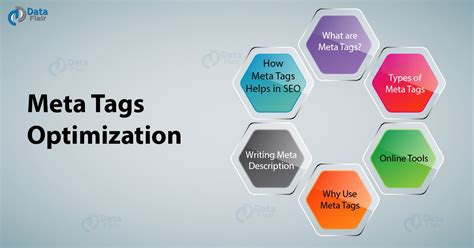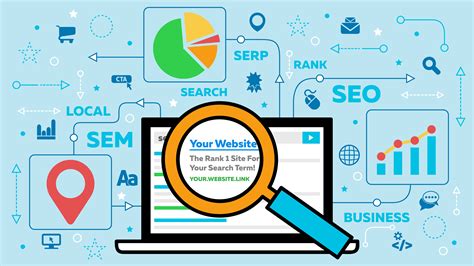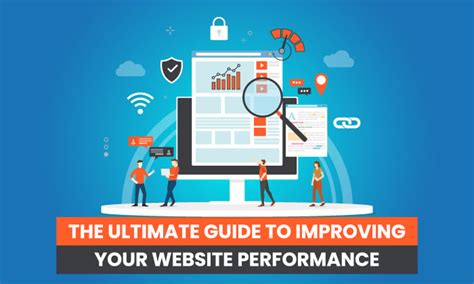In today's fast-paced digitized world, it is crucial for any online business to secure a prominent online presence. One way to achieve this is by improving your website's search engine ranking. Having a favorable position in search engine results not only increases your website's visibility but also drives organic traffic to your virtual doorstep.
The real question is, how can you elevate your website's visibility without breaking the bank? Here, we have compiled a list of 10 proven strategies that can help sharpen your online presence. By implementing these techniques, you can empower your website to stand out amongst the sea of competitors and attract more potential customers.
It's important to understand that optimizing your website for search engines isn't just about stuffing keywords into your content. It requires a well-rounded approach, encompassing various elements such as user experience, quality content creation, link building, and social media engagement. The tips we present here focus on these aspects to provide you with a comprehensive guide to improving your website's search engine ranking.
Maximize Your Website's Loading Speed

In the fast-paced digital world, optimizing your website's loading speed is crucial for improving user experience, increasing engagement, and enhancing overall website performance. Users expect web pages to load quickly and seamlessly, and a slow-loading website can lead to frustration and high bounce rates. In this section, we will explore effective strategies and techniques to maximize your website's loading speed and provide a seamless browsing experience for your visitors.
1. Optimize Image Sizes: Images are integral to website design, but large image files can significantly slow down your website. By optimizing image sizes without compromising on quality, you can reduce load times and enhance user experience.
2. Minify CSS and JavaScript: Removing unnecessary spaces, comments, and reducing file sizes can optimize the loading speed of your website. Minifying CSS and JavaScript files helps to streamline code and improve website performance.
3. Enable Browser Caching: By enabling browser caching, you can store static files on visitors' browsers, allowing them to load your website faster upon subsequent visits. This reduces the need to fetch files from the server every time, resulting in improved loading speed.
4. Utilize Content Delivery Networks (CDNs): CDNs distribute website content across multiple servers worldwide, reducing the physical distance between visitors and your website's server. This leads to faster loading speeds, especially for international visitors.
5. Minimize HTTP Requests: Each element on your web page requires a separate HTTP request, affecting the loading time. By reducing the number of HTTP requests, such as combining CSS and JavaScript files, you can accelerate your website's loading speed.
6. Opt for Gzip Compression: Compressing your website's files using Gzip format reduces their size, allowing them to load faster. Gzip compression is supported by most web browsers and helps to optimize loading speed without sacrificing quality.
7. Ensure Responsive Design: With the increasing use of mobile devices, a responsive website design is essential. Ensuring that your website adapts to various screen sizes and loads quickly on mobile devices improves user experience and positively impacts loading speed.
8. Minimize Redirects: Excessive redirects can slow down your website, as each redirect requires an additional HTTP request. Limiting the number of redirects and optimizing your website's link structure can improve loading speed.
9. Remove Unused Plugins and Scripts: Unused plugins and scripts can add unnecessary bulk to your website, negatively impacting loading speed. Regularly review and remove any plugins or scripts that are not crucial to your website's functionality.
10. Regularly Monitor and Optimize: Monitoring your website's loading speed is essential to identify areas for improvement. Regularly analyze loading times and make necessary optimizations to ensure optimal website performance.
| Key Points: |
| • Optimizing image sizes |
| • Minifying CSS and JavaScript |
| • Enabling browser caching |
| • Utilizing CDNs |
| • Minimizing HTTP requests |
| • Opting for Gzip compression |
| • Ensuring responsive design |
| • Minimizing redirects |
| • Removing unused plugins and scripts |
| • Monitoring and optimizing regularly |
Maximize Your Website's Visibility through Targeted Keyword Integration
When it comes to enhancing your online presence, one crucial aspect to focus on is incorporating relevant keywords within your website's content. Keywords act as the bridge that connects your website with the search engine algorithms, improving its chances of ranking higher in search results.
By intelligently using keywords, you can increase your website's visibility to potential visitors seeking information or services related to your industry. However, it is essential to choose and integrate keywords strategically to ensure that they are relevant and align with the intent of your target audience.
To effectively use keywords, it is vital to conduct thorough research to identify the most appropriate ones for your website. This involves identifying commonly-used terms and phrases within your industry and analyzing their search volumes, competition, and relevance to your website's offerings.
Once you have identified your target keywords, it is essential to integrate them seamlessly within your website's content. This integration should be done in a natural and organic manner, without compromising the readability and user experience of your website.
One effective way to incorporate keywords is by optimizing your website's meta tags, including the title tag, meta description, and header tags. These elements provide search engines with valuable information about the content on your website and help improve its visibility.
Additionally, it is crucial to include keywords within the body of your website's content, such as within headlines, subheadings, and throughout the text. However, it is important to strike a balance and avoid overstuffing keywords, as this can have a negative impact on your website's ranking.
Remember, the ultimate goal is to provide valuable and informative content to your website visitors. By using relevant keywords strategically, you can enhance the visibility of your website, attract more organic traffic, and improve your overall search engine ranking.
Create Compelling and Engaging Content

Undoubtedly, one of the fundamental elements that can significantly enhance your website's online visibility and user engagement is the creation and delivery of high-quality content. When it comes to optimizing your website for search engines, it is important to focus on producing compelling and engaging content that resonates with your target audience.
Achieving a higher search engine ranking requires more than just incorporating keywords or employing technical SEO techniques. It entails crafting well-written, informative, and valuable content that captivates your readers and keeps them coming back for more. By creating content that is both relevant and engaging, you not only improve your chances of ranking higher in search engine results but also establish yourself as an authoritative source in your industry.
When generating content, consider the specific needs and interests of your target audience. Your content should address their pain points, provide solutions, or offer valuable insights. Implementing storytelling techniques and using a conversational tone can help you connect with your readers on a deeper level, making your content more relatable and compelling.
In addition to creating informative content, it's also essential to optimize it for search engines. Incorporate relevant keywords naturally throughout your content and pay attention to on-page SEO elements such as meta tags, headings, and alt text for images.
A well-crafted headline is crucial for grabbing the attention of both search engines and readers. Make sure your headline is clear, concise, and highlights the main benefit or point of your content. Utilize strong and compelling language to entice readers to click and explore further.
Furthermore, incorporating visual elements such as images, infographics, and videos can enhance user experience and make your content more engaging. Visuals not only break up large blocks of text but also help convey information in a more digestible and visually appealing way.
In conclusion, by creating high-quality and engaging content that is tailored to your target audience, you can boost your website's organic search visibility, attract more visitors, and establish your brand as a trusted authority in your industry.
Establishing Strong Backlinks from Trusted Websites
One crucial aspect of enhancing your online presence involves building quality backlinks from reputable websites in your industry. These backlinks act as endorsements and signals to search engines, demonstrating the credibility and authority of your website.
To effectively build quality backlinks, it is essential to focus on partnering with trusted websites that have a strong online reputation. These websites should be relevant to your niche, ensuring that the backlinks you generate are contextual and valuable to both users and search engines.
When seeking to establish backlinks, prioritize websites that are considered authoritative within your industry. High-quality links from these proven sources can significantly enhance your website's organic visibility and improve your chances of ranking higher in search engine results.
Additionally, consider reaching out to influencers, bloggers, and professionals within your niche. Collaborating with these respected individuals can lead to valuable backlinks and increase the visibility and reputation of your website.
To make the most of backlink opportunities, focus on producing high-quality content that others within your industry find valuable and informative. By creating well-researched articles, guides, or resources, you increase the likelihood of other websites linking to your content as a trustworthy source.
It is crucial to note that quality is more important than quantity when it comes to backlinks. Just a few backlinks from authoritative websites can have a more significant impact on your search engine rankings than numerous low-quality links. Spend your time and resources on building strong relationships and securing backlinks from trusted sources.
Remember, building quality backlinks requires a strategic and proactive approach. Regularly monitor your backlink profile, identifying any toxic or low-quality links that could potentially harm your website's reputation. Disavow such links to ensure search engines view your backlink profile in a positive light.
In conclusion, by investing time in building quality backlinks from trusted and authoritative websites, you can significantly enhance your website's search engine visibility and improve its online reputation within your industry.
Maximize Mobile Usability for Optimal Website Performance

In today's digital landscape, where smartphones and tablets have become an integral part of our lives, it is vital to ensure that your website is mobile-friendly. This means optimizing your website's design, content, and functionality to provide a seamless user experience across various mobile devices.
To maximize mobile usability and enhance your website's performance, consider the following tips:
- Adopt a responsive web design approach: Create a design that automatically adjusts and adapts to different screen sizes, resolutions, and orientations.
- Optimize loading speed: Mobile users expect fast-loading websites, so optimize your images, minimize code, and use caching techniques to improve the loading speed of your website.
- Create concise and scannable content: Mobile users have limited attention spans, so it's crucial to present your content in a clear and concise manner. Use headings, subheadings, and bullet points to make your content more scannable.
- Make navigation user-friendly: Ensure that your website's navigation is easy to use on mobile devices. Implement a clear and intuitive menu structure with clickable buttons and minimal scrolling.
- Use mobile-friendly fonts and font sizes: Choose fonts that are easy to read on small screens and ensure that your font sizes are legible without zooming in.
- Optimize your forms for mobile: Simplify your forms by reducing the number of required fields and using mobile-friendly input types like checkboxes and dropdown menus.
- Optimize images and videos: Compress images and use formats that are optimized for mobile devices. Additionally, make sure your videos are responsive and playable on various mobile platforms.
- Test across multiple devices: Regularly test your website on different devices and screen sizes to ensure that it looks and functions correctly on all platforms.
- Implement touch-friendly elements: Ensure that your buttons and links are large enough to be easily tapped with a finger and provide enough spacing to avoid accidental clicks.
- Consider mobile-specific features: Take advantage of mobile-specific features like click-to-call buttons and location-based services to enhance the mobile experience for your users.
By implementing these mobile-friendly practices, you can create a website that not only ranks higher in search engine results but also provides an exceptional user experience for your mobile visitors.
Enhance Your Website's Meta Tags and Descriptions for Improved Performance
In this section, we will explore effective techniques to optimize the meta tags and descriptions of your website, aiming to enhance its visibility and attract more relevant traffic. Enhancing your website's meta tags and descriptions can significantly impact its overall performance and increase its chances of being discovered by search engines.
1. Craft compelling meta titles: Creating unique and attention-grabbing meta titles that accurately describe your website's content is crucial. These titles should be concise, relevant, and include targeted keywords to engage users and entice them to click.
2. Optimize meta descriptions: Meta descriptions serve as a brief summary of your web page's content. Use persuasive language to provide a clear overview of what users can expect when visiting your website. Incorporate relevant keywords to improve search engine visibility.
3. Implement schema markup: Utilize schema markup to provide search engines with additional information about your website's content. This structured data helps search engines understand your website better and display more relevant results to users.
4. Utilize header tags: Incorporate relevant keywords within header tags, such as H1, H2, and H3, to highlight the main topics and subtopics of your web pages. This helps search engines understand the hierarchical structure of your content and improves its visibility for targeted keywords.
5. Focus on keyword optimization: Conduct thorough keyword research to identify relevant keywords and phrases related to your website's content. Incorporate these keywords strategically within your meta tags and descriptions to improve search engine rankings.
6. Avoid duplicate meta tags: Ensure that each page of your website has unique meta tags and descriptions. Duplicate meta tags can confuse search engines and negatively impact your website's search engine ranking.
7. Utilize relevant alt tags: When adding images to your website, use descriptive alt tags that include relevant keywords. Alt tags not only improve accessibility but also contribute to better search engine optimization.
8. Monitor and analyze performance: Regularly monitor the performance of your meta tags and descriptions using analytics tools. Analyze click-through rates and user engagement metrics to identify areas for improvement and make data-driven optimizations.
9. Keep meta tags and descriptions up-to-date: Continuously review and update your meta tags and descriptions to reflect any changes in your website's content or offerings. This ensures that search engines present accurate and relevant information to users.
10. Experiment and iterate: Test different variations of your meta tags and descriptions to understand which combinations drive the most traffic and conversions. Continually experimenting and iterating allows you to refine your optimization strategy and maximize your website's search engine ranking potential.
Optimizing your website's meta tags and descriptions is a crucial step in boosting its visibility and attracting targeted traffic. By implementing these techniques, you can improve your website's search engine ranking and increase its overall performance.
Enhance User Experience for Optimal Website Performance

Creating an exceptional user experience is key to ensuring the success of your website. By optimizing the design, functionality, and content, you can enhance user engagement and satisfaction. Here are some valuable strategies to consider:
1. Intuitive Navigation: Implement a user-friendly navigation structure that allows visitors to easily find the information they are seeking. Use clear and descriptive labels for menu items to ensure smooth browsing.
2. Responsive Design: Ensure your website is responsive and adapts seamlessly to different devices and screen sizes. This will enhance user experience by providing a consistent and visually appealing layout, regardless of the device being used.
3. Fast Loading Speed: Optimize your website's load time to avoid frustrating users with slow page loading. Compress images, minimize unnecessary scripts, and utilize caching techniques to improve overall performance.
4. Engaging Content: Create high-quality and relevant content that is engaging and tailored to your target audience. Incorporate multimedia elements such as videos, infographics, or interactive features to captivate users and keep them coming back for more.
5. Clear Call-to-Actions: Use compelling and visually prominent call-to-action buttons or links to guide users towards desired actions, such as making a purchase, subscribing to a newsletter, or contacting you for more information.
6. Mobile-Friendly Experience: As more users browse the internet on mobile devices, ensure your website provides a seamless mobile experience. Optimize touch-friendly elements and remove any barriers that may hinder mobile users' navigation.
7. Error-Free Functionality: Regularly test your website's functionality and fix any issues promptly. This includes checking for broken links, form validation errors, and ensuring proper functionality of interactive features.
8. Readability and Accessibility: Utilize a clear and legible font, appropriate font size, and sufficient contrast between text and background to ensure readability. Additionally, cater to users with disabilities by adhering to accessibility guidelines for web content.
9. Streamlined Forms: Simplify forms and minimize the number of required fields to streamline the user's experience. Incorporate user-friendly form validation to guide users in providing accurate information without frustration.
10. Continuous Improvement: Regularly collect user feedback and analyze website analytics to identify areas of improvement. Actively implement changes based on user input and emerging trends to ensure your website evolves to meet user expectations.
By implementing these user experience-focused strategies, you will create a website that not only ranks well in search engines but also provides an enjoyable and satisfying experience for your visitors.
FAQ
How can I improve the search engine ranking of my website?
Improving the search engine ranking of your website can be done by following these tips:
Why is it important to optimize loading speed for better search engine ranking?
Optimizing the loading speed of your website is important for better search engine ranking because:
What are some effective ways to build backlinks to my website?
Building backlinks to your website can be done effectively through these strategies:
Why is it important for a website to be mobile-friendly?
Having a mobile-friendly website is important because:













